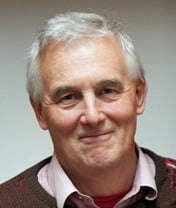WONCA at the WHO's conference on pre-service education for mental health

Professor Christopher Dowrick, a former chair of the WONCA Working Party on Mental Health, represented WONCA at the World Health Organization's conference on pre-service education for mental health in Geneva, Switzerland on December 15th and 16th.
The WHO is aiming to advance in the area of pre-service training in mental health for non-specialist health care providers (e.g., general medicine, nursing, midwifery). To support the development of a prioritized programme of work in the area, the WHO hosted a 2-day in-person consultation titled ‘Preservice Training in Mental Health: Forming the right foundations’.
The objectives of the meeting were to (a) bring together experts and other key stakeholders, for the purpose of sharing information and exchanging views in the field of pre-service training in mental health, particularly for non-specialist healthcare workers, and (b) to start understanding the extent of consensus and evidence for key approaches to increasing the integration of mental health in pre-service training programmes and curricula.The outcome of the meeting was to highlight priority topics in the field of and identify and prioritize key needs and actions.
Prof. Dowrick brought WONCA's expertise to the meeting, including the 2018 Core Competencies in Mental Health guidance document and the ongoing Advocacy project.
The also Emeritus Professor of the University of Liverpool, UK wrote:
The WHO conference on pre-service education for mental health, which took place in Geneva, was very successful. There was good attendance from senior psychiatric, mental health nursing and social work colleagues from all WHO regions, as well as UNICEF, World Psychiatric Association and International Association of Medical Regulatory Authorities, and strong buy-in from the Director and other senior members of WHO Department of Mental Health and Substance Use. The meeting was ably chaired by Shekhar Saxena.
The focus was on developing guidance for low and middle income countries on why and how to include mental health in undergraduate curricula. There was also awareness of the need to develop pre-service training at postgraduate clinical level. Through a series of presentations and guided workshops we refined the concept, definition and nature of effective pre-service education and offered advice to WHO on actions they needed to take to support LMICs in implementing pre-service education at scale. There were impressive presentations of achievements in, for example, Philippines, Nigeria and India, and cogent discussion of the importance of assessment and certification and of the actions needed to ensure programme endorsement.
I was delighted to represent WONCA. It was clear that the role of family doctors in this field is valued and appreciated, for example our guidance on core competencies, and that we are known to have considerable expertise to offer our mental health colleagues. I had specific conversations with colleagues from Mexico, India and Nigeria which may lead to direct connections in these countries.
The plan is for WHO to produce a practical report. There will be opportunities for WONCA not only to comment on substantive drafts but also to offer organisational endorsement. I would encourage WONCA executive to pursue both of these options.